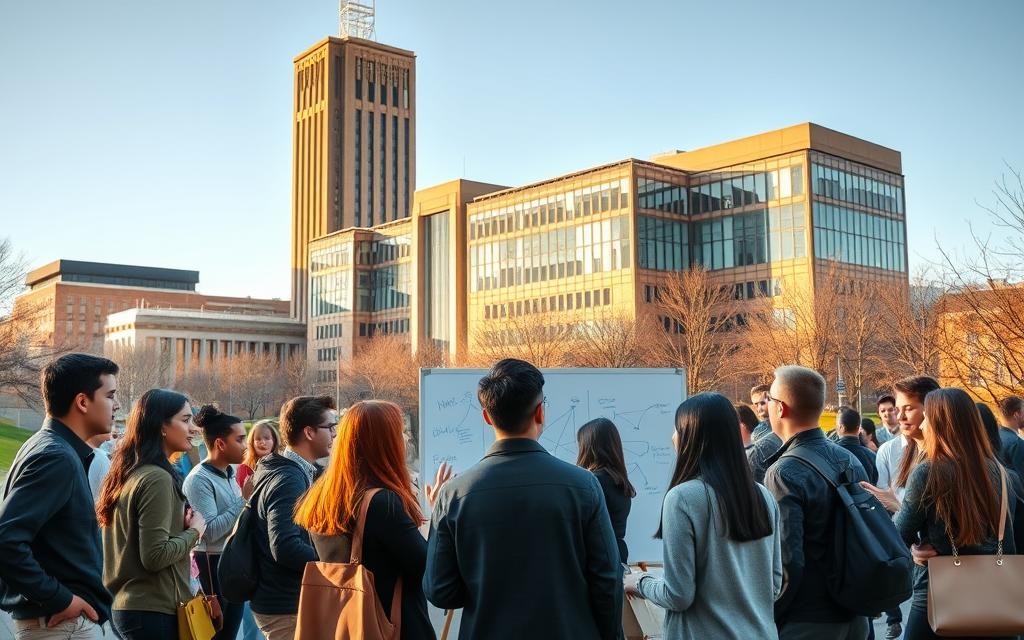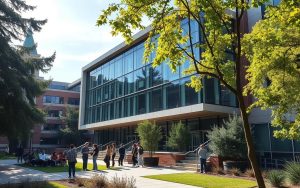Table of Contents
Students at this prestigious institution gain hands-on learning through structured work opportunities. The co-op program offers a five-year track with three alternating work terms, blending classroom knowledge with real-world practice.
Unlike single-semester internships, this approach provides deeper industry exposure. Participants maintain full-time enrollment while gaining paid experience at leading tech companies. The model has thrived for over a century, connecting learners with top employers nationwide.
Benefits include academic credit, competitive salaries, and a specialized diploma designation. This initiative reflects the school’s commitment to merging theory with practical education. Graduates often secure strong professional networks before completing their degrees.
Both co-ops and shorter internships help build career-ready skills. The institution’s reputation ensures access to high-quality placements across multiple industries. Learners can choose the path that best fits their professional goals.
Does Georgia Tech Have a Co-Op Program for Computer Science?
Learners engage in a multi-term rotation system designed to enhance technical skills. The co-op program spans five years, integrating three paid work semesters with academic study. This model fosters deeper industry connections than traditional short-term roles.
Program Structure and Duration
Participants complete one summer and two academic terms, working 40 hours weekly. Full-time work phases alternate with campus study, ensuring hands-on practice without delaying graduation. Key features include:
- 12 audit hours per term to maintain enrollment
- Flexible housing options during employer placements
- Mandatory performance reviews and work reports
Comparison with Internship Options
While co-ops offer extended engagement, internships provide shorter commitments. Below is a detailed breakdown:
| Feature | Co-Op | Internship |
|---|---|---|
| Duration | 3 semesters | 1 semester (8–14 weeks) |
| Hours/Week | 40 | 10–36+ |
| Academic Credit | Fixed 12 hours | Scaled by workload |
Both paths require a 2.0 GPA and application through CareerBuzz. Co-ops suit those seeking long-term employer relationships, while internships fit exploratory goals.
Benefits of Georgia Tech’s CS Co-Op and Internship Programs
Employer partnerships create pathways for students to excel in competitive tech fields. These programs blend academic rigor with paid work experience, offering a strategic edge in today’s job market.

Career and Academic Advantages
Participants gain access to 700+ global employers, including Microsoft and NASA. Alumni report a 94% employment rate post-graduation, with many securing roles at their co-op companies.
Key perks include:
- Competitive salaries: Top roles pay $25–$40/hour in software development and data analytics.
- Resume-building projects tackling real-world challenges.
- Eligibility for the Briaerean Honors Society and specialized diploma designation.
Networking and Long-Term Growth
Exclusive career fairs connect learners with industry leaders. Mentorship programs provide personalized guidance, while housing flexibility supports relocation for work terms.
| Employer | Role | Avg. Stipend (Summer) |
|---|---|---|
| Software Engineer | $7,200 | |
| Lockheed Martin | Cybersecurity Analyst | $6,500 |
Federal internships offer stipends up to $7,500, with many students transitioning to full-time roles. This model turns classroom knowledge into a thriving career foundation.
How to Apply for Georgia Tech’s CS Co-Op Program
Securing a spot in the co-op program requires careful planning and timely submissions. The process blends academic checks with professional preparation, ensuring students meet employer expectations.
Eligibility Requirements
Participants must maintain a 2.0 GPA and full-time enrollment. Key criteria include:
- Academic standing: Minimum 12 credit hours per term.
- Completed coursework in data structures or algorithms.
- Approval from the Career Center advisor.
“Early registration doubles placement chances for competitive roles.”
Documentation and Deadlines
Submit these materials via CareerBuzz:
- Resume (using campus templates).
- Work Term Goals form.
- Performance evaluations from past employers.
| Opportunity | Deadline | Notes |
|---|---|---|
| NYC Climate Exchange | Feb 28 | Requires climate science elective |
| Federal Internships | March 15 | U.S. citizenship required |
Applications review takes 48 hours. Late submissions risk missing program cycles. International students need additional visa paperwork.
Additional Experiential Learning Opportunities for CS Majors
Beyond traditional co-ops, multiple pathways exist for hands-on growth in tech fields. These initiatives blend academic rigor with niche industry demands, offering *students* tailored ways to build expertise.

Specialized Internships
The Sustainable Communities Internship delivers 12-week projects focused on urban tech solutions. Participants tackle smart city challenges alongside municipal *employers*, earning academic credit.
For entrepreneurial minds, the Xperience Startup Fund offsets costs for unpaid roles at emerging tech firms. Grants cover living expenses, ensuring access to high-impact *work*.
- NYC Climate Exchange: Technical roles in renewable energy systems.
- Smart Community Corps: IoT deployments with civic partners like Cisco.
- AI/ML Tracks: Research assistantships with corporate sponsors.
Federal and Legislative Programs
“Federal Jackets Fellows receive $7,500 stipends plus clearance support for national security roles.”
The GLIP (Georgia Legislative Internship Program) pairs *students* with state lawmakers. Paid *terms* include policy analysis and tech bill drafting, convertible to elective credits.
| Program | Duration | Benefits |
|---|---|---|
| Congressional Fellowship | Fall/Spring | DC housing + networking |
| Delta Tech Scholars | Summer | Travel perks + mentorship |
Cross-disciplinary options with Engineering expand *opportunities* in aerospace and cybersecurity. Each *plan* aligns with industry trends, ensuring relevant *education*.
Conclusion
The structured co-op program offers a unique blend of paid experience and academic rigor. Unlike single-term roles, this multi-semester approach builds lasting connections with top employers.
Key takeaways include:
- Three work terms enhance technical skills while earning competitive wages
- Graduates receive a specialized designation, boosting career prospects
- Flexible internship options cater to diverse learning goals
Notable alumni have transitioned directly into roles at Fortune 500 companies. The 2024-25 cycle introduces expanded partnerships in AI and sustainable tech.
Ready to start? Explore opportunities through the CareerBuzz portal. Leverage Georgia Tech’s industry network to accelerate your path to graduation and beyond.
FAQ
What is the structure of Georgia Tech’s co-op program for computer science?
The program alternates between academic semesters and full-time work terms, allowing students to gain hands-on experience while completing their degree. Participants typically complete three work rotations with the same employer.
How does a co-op differ from a traditional internship?
Unlike short-term internships, co-ops involve multiple semesters of paid work experience with the same company. This extended engagement provides deeper industry exposure and stronger professional connections.
What are the career benefits of participating in the co-op program?
Students build industry-specific skills, expand their professional network, and often receive full-time job offers before graduation. Many employers view co-op experience as equivalent to entry-level work.
When should computer science majors apply for the co-op program?
Most students apply during their sophomore year after completing core coursework. Early registration ensures access to employer partnerships and career development resources.
Are international students eligible for Georgia Tech’s co-op program?
Yes, international participants can enroll but must maintain proper visa status. The Office of International Education provides guidance on work authorization requirements.
What other experiential learning options exist beyond co-ops?
The institute offers research assistantships, startup incubators, and government-sponsored programs like the Federal Work-Study initiative for qualifying students.
Does co-op participation delay graduation?
While the program adds 1-2 semesters to degree completion, many students offset this through summer coursework or advanced placement credits.
How competitive is admission to the co-op program?
Selection depends on academic performance, technical skills, and interview readiness. Strong candidates typically maintain a 3.0+ GPA and demonstrate relevant project experience.









